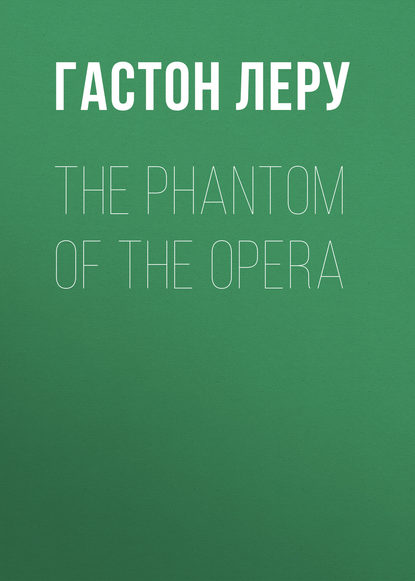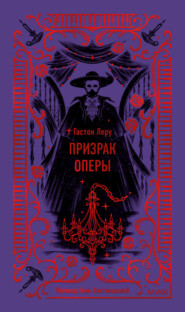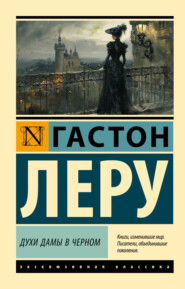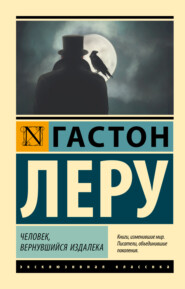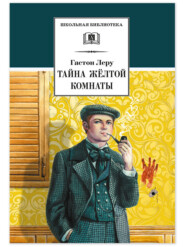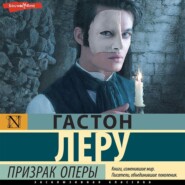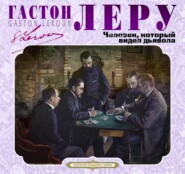По всем вопросам обращайтесь на: info@litportal.ru
(©) 2003-2024.
✖
The Phantom of the Opera
Автор
Год написания книги
2018
Настройки чтения
Размер шрифта
Высота строк
Поля
"Mauclair! Poor devil! He is dead!"
But Mr. Commissary Mifroid, whom nothing surprised, was stooping over that big body.
"No," he said, "he is dead-drunk, which is not quite the same thing."
"It's the first time, if so," said the stage-manager
"Then some one has given him a narcotic. That is quite possible."
Mifroid went down a few steps and said:
"Look!"
By the light of a little red lantern, at the foot of the stairs, they saw two other bodies. The stage-manager recognized Mauclair's assistants. Mifroid went down and listened to their breathing.
"They are sound asleep," he said. "Very curious business! Some person unknown must have interfered with the gas-man and his staff … and that person unknown was obviously working on behalf of the kidnapper … But what a funny idea to kidnap a performer on the stage! … Send for the doctor of the theater, please." And Mifroid repeated, "Curious, decidedly curious business!"
Then he turned to the little room, addressing the people whom Raoul and the Persian were unable to see from where they lay.
"What do you say to all this, gentlemen? You are the only ones who have not given your views. And yet you must have an opinion of some sort."
Thereupon, Raoul and the Persian saw the startled faces of the joint managers appear above the landing—and they heard Moncharmin's excited voice:
"There are things happening here, Mr. Commissary, which we are unable to explain."
And the two faces disappeared.
"Thank you for the information, gentlemen," said Mifroid, with a jeer.
But the stage-manager, holding his chin in the hollow of his right hand, which is the attitude of profound thought, said:
"It is not the first time that Mauclair has fallen asleep in the theater. I remember finding him, one evening, snoring in his little recess, with his snuff-box beside him."
"Is that long ago?" asked M. Mifroid, carefully wiping his eye-glasses.
"No, not so very long ago … Wait a bit! … It was the night … of course, yes … It was the night when Carlotta—you know, Mr. Commissary—gave her famous 'co-ack'!"
"Really? The night when Carlotta gave her famous 'co-ack'?"
And M. Mifroid, replacing his gleaming glasses on his nose, fixed the stage-manager with a contemplative stare.
"So Mauclair takes snuff, does he?" he asked carelessly.
"'Yes, Mr. Commissary … Look, there is his snuff-box on that little shelf … Oh! he's a great snuff-taker!"
"So am I," said Mifroid and put the snuff-box in his pocket.
Raoul and the Persian, themselves unobserved, watched the removal of the three bodies by a number of scene-shifters, who were followed by the commissary and all the people with him. Their steps were heard for a few minutes on the stage above. When they were alone the Persian made a sign to Raoul to stand up. Raoul did so; but, as he did not lift his hand in front of his eyes, ready to fire, the Persian told him to resume that attitude and to continue it, whatever happened.
"But it tires the hand unnecessarily," whispered Raoul. "If I do fire, I shan't be sure of my aim."
"Then shift your pistol to the other hand," said the Persian.
"I can't shoot with my left hand."
Thereupon, the Persian made this queer reply, which was certainly not calculated to throw light into the young man's flurried brain:
"It's not a question of shooting with the right hand or the left; it's a question of holding one of your hands as though you were going to pull the trigger of a pistol with your arm bent. As for the pistol itself, when all is said, you can put that in your pocket!" And he added, "Let this be clearly understood, or I will answer for nothing. It is a matter of life and death. And now, silence and follow me!"
The cellars of the Opera are enormous and they are five in number. Raoul followed the Persian and wondered what he would have done without his companion in that extraordinary labyrinth. They went down to the third cellar; and their progress was still lit by some distant lamp.
The lower they went, the more precautions the Persian seemed to take. He kept on turning to Raoul to see if he was holding his arm properly, showing him how he himself carried his hand as if always ready to fire, though the pistol was in his pocket.
Suddenly, a loud voice made them stop. Some one above them shouted:
"All the door-shutters on the stage! The commissary of police wants them!"
Steps were heard and shadows glided through the darkness. The Persian drew Raoul behind a set piece. They saw passing before and above them old men bent by age and the past burden of opera-scenery. Some could hardly drag themselves along; others, from habit, with stooping bodies and outstretched hands, looked for doors to shut.
They were the door-shutters, the old, worn-out scene-shifters, on whom a charitable management had taken pity, giving them the job of shutting doors above and below the stage. They went about incessantly, from top to bottom of the building, shutting the doors; and they were also called "The draft-expellers," at least at that time, for I have little doubt that by now they are all dead. Drafts are very bad for the voice, wherever they may come from.[3 - M. Pedro Gailhard has himself told me that he created a few additional posts as door-shutters for old stage-carpenters whom he was unwilling to dismiss from the service of the Opera.]
The two men might have stumbled over them, waking them up and provoking a request for explanations. For the moment, M. Mifroid's inquiry saved them from any such unpleasant encounters.
The Persian and Raoul welcomed this incident, which relieved them of inconvenient witnesses, for some of those door-shutters, having nothing else to do or nowhere to lay their heads, stayed at the Opera, from idleness or necessity, and spent the night there.
But they were not left to enjoy their solitude for long. Other shades now came down by the same way by which the door-shutters had gone up. Each of these shades carried a little lantern and moved it about, above, below and all around, as though looking for something or somebody.
"Hang it!" muttered the Persian. "I don't know what they are looking for, but they might easily find us … Let us get away, quick! … Your hand up, sir, ready to fire! … Bend your arm … more … that's it! … Hand at the level of your eye, as though you were fighting a duel and waiting for the word to fire! Oh, leave your pistol in your pocket. Quick, come along, down-stairs. Level of your eye! Question of life or death! … Here, this way, these stairs!" They reached the fifth cellar. "Oh, what a duel, sir, what a duel!"
Once in the fifth cellar, the Persian drew breath. He seemed to enjoy a rather greater sense of security than he had displayed when they both stopped in the third; but he never altered the attitude of his hand. And Raoul, remembering the Persian's observation—"I know these pistols can be relied upon"—was more and more astonished, wondering why any one should be so gratified at being able to rely upon a pistol which he did not intend to use!
But the Persian left him no time for reflection. Telling Raoul to stay where he was, he ran up a few steps of the staircase which they had just left and then returned.
"How stupid of us!" he whispered. "We shall soon have seen the end of those men with their lanterns. It is the firemen going their rounds."[4 - In those days, it was still part of the firemen's duty to watch over the safety of the Opera house outside the performances; but this service has since been suppressed. I asked M. Pedro Gailhard the reason, and he replied:"It was because the management was afraid that, in their utter inexperience of the cellars of the Opera, the firemen might set fire to the building!"]
The two men waited five minutes longer. Then the Persian took Raoul up the stairs again; but suddenly he stopped him with a gesture. Something moved in the darkness before them.
"Flat on your stomach!" whispered the Persian.
The two men lay flat on the floor.
They were only just in time. A shade, this time carrying no light, just a shade in the shade, passed. It passed close to them, near enough to touch them.
They felt the warmth of its cloak upon them. For they could distinguish the shade sufficiently to see that it wore a cloak which shrouded it from head to foot. On its head it had a soft felt hat …
It moved away, drawing its feet against the walls and sometimes giving a kick into a corner.
"Whew!" said the Persian. "We've had a narrow escape; that shade knows me and has twice taken me to the managers' office."
But Mr. Commissary Mifroid, whom nothing surprised, was stooping over that big body.
"No," he said, "he is dead-drunk, which is not quite the same thing."
"It's the first time, if so," said the stage-manager
"Then some one has given him a narcotic. That is quite possible."
Mifroid went down a few steps and said:
"Look!"
By the light of a little red lantern, at the foot of the stairs, they saw two other bodies. The stage-manager recognized Mauclair's assistants. Mifroid went down and listened to their breathing.
"They are sound asleep," he said. "Very curious business! Some person unknown must have interfered with the gas-man and his staff … and that person unknown was obviously working on behalf of the kidnapper … But what a funny idea to kidnap a performer on the stage! … Send for the doctor of the theater, please." And Mifroid repeated, "Curious, decidedly curious business!"
Then he turned to the little room, addressing the people whom Raoul and the Persian were unable to see from where they lay.
"What do you say to all this, gentlemen? You are the only ones who have not given your views. And yet you must have an opinion of some sort."
Thereupon, Raoul and the Persian saw the startled faces of the joint managers appear above the landing—and they heard Moncharmin's excited voice:
"There are things happening here, Mr. Commissary, which we are unable to explain."
And the two faces disappeared.
"Thank you for the information, gentlemen," said Mifroid, with a jeer.
But the stage-manager, holding his chin in the hollow of his right hand, which is the attitude of profound thought, said:
"It is not the first time that Mauclair has fallen asleep in the theater. I remember finding him, one evening, snoring in his little recess, with his snuff-box beside him."
"Is that long ago?" asked M. Mifroid, carefully wiping his eye-glasses.
"No, not so very long ago … Wait a bit! … It was the night … of course, yes … It was the night when Carlotta—you know, Mr. Commissary—gave her famous 'co-ack'!"
"Really? The night when Carlotta gave her famous 'co-ack'?"
And M. Mifroid, replacing his gleaming glasses on his nose, fixed the stage-manager with a contemplative stare.
"So Mauclair takes snuff, does he?" he asked carelessly.
"'Yes, Mr. Commissary … Look, there is his snuff-box on that little shelf … Oh! he's a great snuff-taker!"
"So am I," said Mifroid and put the snuff-box in his pocket.
Raoul and the Persian, themselves unobserved, watched the removal of the three bodies by a number of scene-shifters, who were followed by the commissary and all the people with him. Their steps were heard for a few minutes on the stage above. When they were alone the Persian made a sign to Raoul to stand up. Raoul did so; but, as he did not lift his hand in front of his eyes, ready to fire, the Persian told him to resume that attitude and to continue it, whatever happened.
"But it tires the hand unnecessarily," whispered Raoul. "If I do fire, I shan't be sure of my aim."
"Then shift your pistol to the other hand," said the Persian.
"I can't shoot with my left hand."
Thereupon, the Persian made this queer reply, which was certainly not calculated to throw light into the young man's flurried brain:
"It's not a question of shooting with the right hand or the left; it's a question of holding one of your hands as though you were going to pull the trigger of a pistol with your arm bent. As for the pistol itself, when all is said, you can put that in your pocket!" And he added, "Let this be clearly understood, or I will answer for nothing. It is a matter of life and death. And now, silence and follow me!"
The cellars of the Opera are enormous and they are five in number. Raoul followed the Persian and wondered what he would have done without his companion in that extraordinary labyrinth. They went down to the third cellar; and their progress was still lit by some distant lamp.
The lower they went, the more precautions the Persian seemed to take. He kept on turning to Raoul to see if he was holding his arm properly, showing him how he himself carried his hand as if always ready to fire, though the pistol was in his pocket.
Suddenly, a loud voice made them stop. Some one above them shouted:
"All the door-shutters on the stage! The commissary of police wants them!"
Steps were heard and shadows glided through the darkness. The Persian drew Raoul behind a set piece. They saw passing before and above them old men bent by age and the past burden of opera-scenery. Some could hardly drag themselves along; others, from habit, with stooping bodies and outstretched hands, looked for doors to shut.
They were the door-shutters, the old, worn-out scene-shifters, on whom a charitable management had taken pity, giving them the job of shutting doors above and below the stage. They went about incessantly, from top to bottom of the building, shutting the doors; and they were also called "The draft-expellers," at least at that time, for I have little doubt that by now they are all dead. Drafts are very bad for the voice, wherever they may come from.[3 - M. Pedro Gailhard has himself told me that he created a few additional posts as door-shutters for old stage-carpenters whom he was unwilling to dismiss from the service of the Opera.]
The two men might have stumbled over them, waking them up and provoking a request for explanations. For the moment, M. Mifroid's inquiry saved them from any such unpleasant encounters.
The Persian and Raoul welcomed this incident, which relieved them of inconvenient witnesses, for some of those door-shutters, having nothing else to do or nowhere to lay their heads, stayed at the Opera, from idleness or necessity, and spent the night there.
But they were not left to enjoy their solitude for long. Other shades now came down by the same way by which the door-shutters had gone up. Each of these shades carried a little lantern and moved it about, above, below and all around, as though looking for something or somebody.
"Hang it!" muttered the Persian. "I don't know what they are looking for, but they might easily find us … Let us get away, quick! … Your hand up, sir, ready to fire! … Bend your arm … more … that's it! … Hand at the level of your eye, as though you were fighting a duel and waiting for the word to fire! Oh, leave your pistol in your pocket. Quick, come along, down-stairs. Level of your eye! Question of life or death! … Here, this way, these stairs!" They reached the fifth cellar. "Oh, what a duel, sir, what a duel!"
Once in the fifth cellar, the Persian drew breath. He seemed to enjoy a rather greater sense of security than he had displayed when they both stopped in the third; but he never altered the attitude of his hand. And Raoul, remembering the Persian's observation—"I know these pistols can be relied upon"—was more and more astonished, wondering why any one should be so gratified at being able to rely upon a pistol which he did not intend to use!
But the Persian left him no time for reflection. Telling Raoul to stay where he was, he ran up a few steps of the staircase which they had just left and then returned.
"How stupid of us!" he whispered. "We shall soon have seen the end of those men with their lanterns. It is the firemen going their rounds."[4 - In those days, it was still part of the firemen's duty to watch over the safety of the Opera house outside the performances; but this service has since been suppressed. I asked M. Pedro Gailhard the reason, and he replied:"It was because the management was afraid that, in their utter inexperience of the cellars of the Opera, the firemen might set fire to the building!"]
The two men waited five minutes longer. Then the Persian took Raoul up the stairs again; but suddenly he stopped him with a gesture. Something moved in the darkness before them.
"Flat on your stomach!" whispered the Persian.
The two men lay flat on the floor.
They were only just in time. A shade, this time carrying no light, just a shade in the shade, passed. It passed close to them, near enough to touch them.
They felt the warmth of its cloak upon them. For they could distinguish the shade sufficiently to see that it wore a cloak which shrouded it from head to foot. On its head it had a soft felt hat …
It moved away, drawing its feet against the walls and sometimes giving a kick into a corner.
"Whew!" said the Persian. "We've had a narrow escape; that shade knows me and has twice taken me to the managers' office."





